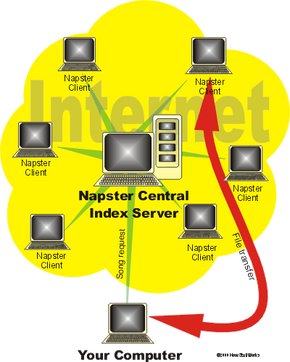The simple fact is that P2P is here to stay, regardless of legality disputes. Since the introduction of Napster, many other similar utilities and Web sites have appeared. And most of them do not limit file sharing to just MP3s as Napster did. Some, like Gnutella, allow virtually anything to be shared.
Another feature of some of these P2P utilities is the elimination of the need for a central index server. In true peer-to-peer fashion, these utilities search each other out online. For example, as soon as a Gnutella client comes online, it says "Hello, I'm here" to another Gnutella client. That client then tells eight other clients that it has already established contact with the new one. Each of those eight then tell seven others, who tell six others and so on. This way, each client has a larger number of other clients who know it is online and what content it has available.
P2P utilities that employ this decentralized approach are virtually impossible to shut down. Since there is no central server maintaining the index of users, there is no easy way to target and stop the use of the program. Many of the content developers in music, video and other industries are beginning to realize that fundamental changes in the way royalties and licensing work are vital to keep up with the revolutionary world of the Internet.
Probably the biggest question that most people have about Napster is, "How did they make money?" The short answer is, "They didn't." Initially, Napster was not intended to be a revenue-generating business. Like many great inventors before, Shawn Fanning created the program to see if it could be done, not because of money. But even he had no idea how big it would become.
For more information on Napster, file-sharing, MP3s and related topics, check out the links on the next page.
